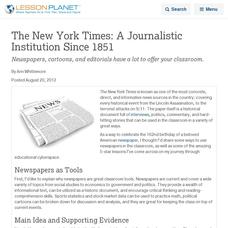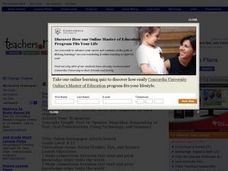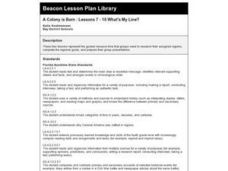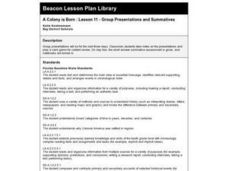Curated OER
A Better Class of Journal-ists
Young academics create a current events journal by skimming newspapers for articles that fit defined guidelines for informational texts. After cutting out two articles each week to add to their journals, they write a brief description of...
Curated OER
Political Cartoons
Students examine a variety of historical cartoons. They recognize a political cartoon and identify the main idea, symbolism, exaggeration and caricature in political cartoons. Students analyze a political cartoon by Benjamin Franklin.
University of Kansas
Newspaper in the Classroom
Newspapers aren't only for reading—they're for learning skills, too! A journalism unit provides three lessons each for primary, intermediate, and secondary grades. Lessons include objectives, materials, vocabulary, and procedure, and...
Curated OER
Cruise the News
Students utilize newspapers as a resource to complete various tasks. They read articles, write summaries, investigate the classified section, write commercials, and circle spelling words.
Judicial Branch of California
Defining Civic Duty and Participation
A lesson, geared toward older elementary scholars, combines art with social studies to explain the purpose of civic duty and how to encourage others in the community to participate. Academics create advertising campaigns to promote civic...
Equality and Human Rights Commission
Influencing Attitudes
Does propaganda—like that used during the first World War—exist today? The 11th lesson in a series of 12 highlights the role of media when it comes to influencing attitudes. Scholars learn about sensational headlines, misrepresentation...
National First Ladies' Library
All the News That's Fit to Draw: Political Cartooning and the Presidency
Students research, analyze and study the history of political cartooning in the United States. They recognize a political cartoon, be able to identify the main idea, the symbols and the exaggeration and caricature in political cartoons....
Curated OER
Local and National News
Young scholars work together in small groups, negotiate, plan, summarize, analyze, read and understand, speak so others can understand, cooperate with others, and listen critically. Students use local newspapers to draw their...
Curated OER
Nonviolent Conflict Resolutions with Cesar Chavez
Third graders investigate nonviolent conflict resolution strategies. In this interpersonal communication lesson, 3rd graders explore conflict resolution. Students construct a newspaper/magazine article detailing nonviolent conflict...
Curated OER
From the Beginning of Time, Online: Using the Internet to Explore History
Students use the Internet to research historical events. They compare and contrast different websites to find the best information. They write summaries based on the information they found and give presentations.
Curated OER
Sounding Off About Impeachment
Help your middle and high schoolers reflect on the responsibility of newspapers to act as a vehicle for 'everyday citizens' to voice their opinions. Then, using an article about the first day of the Senate impeachment trial of President...
Curated OER
The New York Times: A Journalistic Institution Since 1851
Newspapers, cartoons, and editorials have a lot to offer your classroom.
Curated OER
Political Cartoons: Literacy
Readers decode and deconstruct political cartoons to heighten critical thinking, extra-textual literacy, and making meaning from symbolism and metaphor. A compatible activity to use in English class when your 8th or 11th graders are...
Carolina K-12
Propaganda, Spin and Soundbite Politics
It's all about the spin! In an introduction to propaganda techniques and soundbite politics, scholars first learn about common propaganda techniques before seeing them in action in the context of the 2016 election cycle. Activities...
Curated OER
Teeshirt Printing
Students become responsible and involved citizens. In this t-shirt printing lesson students design and create a teeshirt with a message about citizenship and responsibility. Natural objects are used as stamps.
Curated OER
The Mass Media and Politics
What effect do the prevalence of televisions in homes have on the American political stage? Challenge your students to consider this idea with these ten questions, both true/false and multiple choice. You could use this activity as a...
Curated OER
Roles of the President
Students read a document which explains the roles and responsibilities of the President of the United States. In groups, they tour the George Bush Presidential Museum and participate in a Presidential scavenger hunt. Once back in the...
Curated OER
Online Newspaper Search
Middle schoolers use the Internet to research an article. When they find an article they like, it be printed and they highlight the important information and present to the class.
Curated OER
Biographical Research Paper
Students choose a subject for a biographical research paper. They use books, the Internet, encyclopedias and articles to gather information on a determined subject then follow a rubric to write a research paper.
Curated OER
Looking After Pets
Students work in groups to compose their own "Duty of Care" for pets and make their own individual list from this discussion and illustrate it with drawing or images taken from magazines, websites or newspapers.
Curated OER
Expressions of Belief: Easter
In this Easter worksheet, students write a poem, make a collage, and discuss what Easter is about. Students complete 3 tasks total.
Curated OER
A Colony is Born : Lesson 6 -To Leave or Not to Leave
Fifth graders connect reasons for coming to the New World with identity. The create identities and place them in one of three settled regions. They refer to prior study notes in their Colonial Notebooks to establish their identities.
Curated OER
A Colony is Born : Lessons 7 - 10 What's My Line?
Fifth graders research their assigned regions, complete regional guide and prepare presentations about the New World colonists. They refer to "Everyday LIfe: Colonial Times" as well as searching marked internet sites.
Curated OER
A Colony is Born : Lesson 11 - Group Presentations and Summatives
Fifth graders give presentations on colonial research. The others take notes on the presentations. They play a card game which helps them review content. They take a summative assessment and present their research notebooks.























